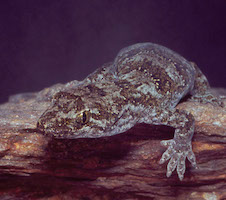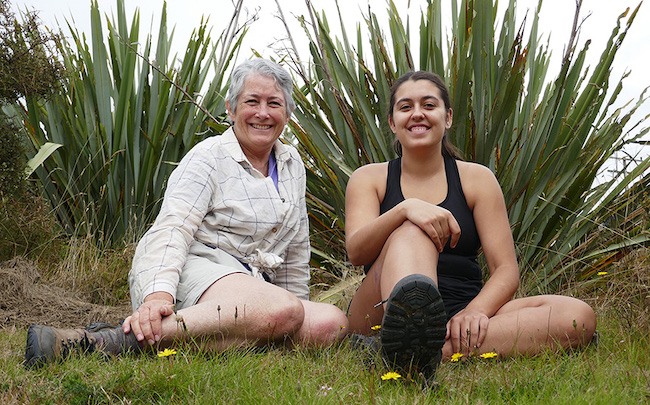Virens, E., & Cree, A. (2022). Wind of change: A diurnal skink thermoregulates between cooler set-points and for an increased amount of time in the presence of wind. Journal of Experimental Biology, 225, jeb244038. doi: 10.1242/jeb.244038
Journal - Research Article
Chukwuka, C. O., Mello, R. S. R., Cree, A., & Monks, J. M. (2021). Thermal heterogeneity of selected retreats in cool-temperate viviparous lizards suggests a potential benefit of future climate warming. Journal of Thermal Biology, 97, 102869. doi: 10.1016/j.jtherbio.2021.102869
Journal - Research Article
Jarvie, S., Worthy, T. H., Saltré, F., Scofield, R. P., Seddon, P. J., & Cree, A. (2021). Using Holocene fossils to model the future: Distribution of climate suitability for tuatara, the last rhynchocephalian. Journal of Biogeography, 48, 1489-1502. doi: 10.1111/jbi.14092
Journal - Research Article
Bertoia, A., Monks, J., Knox, C., & Cree, A. (2021). A nocturnally foraging gecko of the high-latitude alpine zone: Extreme tolerance of cold nights, with cryptic basking by day. Journal of Thermal Biology, 99, 102957. doi: 10.1016/j.jtherbio.2021.102957
Journal - Research Article
Chukwuka, C. O., Monks, J. M., & Cree, A. (2020). Heat and water loss vs shelter: A dilemma in thermoregulatory decision making for a retreat-dwelling nocturnal gecko. Journal of Experimental Biology, 223, jeb231241. doi: 10.1242/jeb.231241
Journal - Research Article
Moore, G., Penniket, S., & Cree, A. (2020). Greater basking opportunity and warmer nights during late pregnancy advance modal birth season in a live-bearing gecko, lowering the risk of reduced embryonic condition. Biological Journal of the Linnean Society, 130, 128-141. doi: 10.1093/biolinnean/blaa017
Journal - Research Article
Hare, J. R., Holmes, K. M., Wilson, J. L., & Cree, A. (2009). Modelling exposure to selected temperature during pregnancy: The limitations of squamate viviparity in a cool-climate environment. Biological Journal of the Linnean Society, 96(3), 541-552. doi: 10.1111/j.1095-8312.2008.01151.x
Journal - Research Article
Hare, K. M., Yeong, C., & Cree, A. (2011). Does gestational temperature or prenatal sex ratio influence development of sexual dimorphism in a viviparous skink? Journal of Experimental Zoology Part A: Ecological Genetics & Physiology, 315A(4), 215-221. doi: 10.1002/jez.667
Journal - Research Article
Towns, D. R., Parrish, G. R., Tyrrell, C. L., Ussher, G. T., Cree, A., Newman, D. G., … Westbrooke, I. (2007). Responses of tuatara (Sphenodon punctatus) to removal of introduced Pacific rats from islands. Conservation Biology, 21(4), 1021-1031.
Journal - Research Article
Connolly, J. D., & Cree, A. (2008). Risks of a late start to captive management for conservation: Phenotypic differences between wild and captive individuals of a viviparous endangered skink (Oligosoma otagense). Biological Conservation, 141(5), 1283-1292. doi: 10.1016/j.biocon.2008.02.026
Journal - Research Article
Besson, A. A., & Cree, A. (2010). A cold-adapted reptile becomes a more effective thermoregulator in a thermally challenging environment. Oecologia, 163, 571-581. doi: 10.1007/s00442-010-1571-y
Journal - Research Article
Hare, K. M., Caldwell, A. J., & Cree, A. (2012). Effects of early postnatal environment on phenotype and survival of a lizard. Oecologia, 168, 639-649. doi: 10.1007/s00442-011-2145-3
Journal - Research Article
Gaby, M. J., Besson, A. A., Bezzina, C. N., Caldwell, A. J., Cosgrove, S., Cree, A., … Hare, K. M. (2011). Thermal dependence of locomotor performance in two cool-temperate lizards. Journal of Comparative Physiology A, 197(9), 869-875. doi: 10.1007/s00359-011-0648-3
Journal - Research Article
Germano, J. M., Molinia, F. C., Bishop, P. J., Bell, B. D., & Cree, A. (2012). Urinary hormone metabolites identify sex and imply unexpected winter breeding in an endangered, subterranean-nesting frog. General & Comparative Endocrinology, 175(3), 464-472. doi: 10.1016/j.ygcen.2011.12.003
Journal - Research Article
Cree, A., & Hare, K. M. (2010). Equal thermal opportunity does not result in equal gestation length in a cool-climate skink and gecko. Herpetological Conservation & Biology, 5(2), 271-282.
Journal - Research Article
Hare, K. M., & Cree, A. (2010). Exploring the consequences of climate-induced changes in cloud cover on offspring of a cool-temperate viviparous lizard. Biological Journal of the Linnean Society, 101(4), 844-851. doi: 10.1111/j.1095-8312.2010.01536.x
Journal - Research Article
Lettink, M., Norbury, G., Cree, A., Seddon, P. J., Duncan, R. P., & Schwarz, C. J. (2010). Removal of introduced predators, but not artificial refuge supplementation, increases skink survival in coastal duneland. Biological Conservation, 143(1), 72-77. doi: 10.1016/j.biocon.2009.09.004
Journal - Research Article
Preest, M. R., & Cree, A. (2008). Corticosterone treatment has subtle effects on thermoregulatory behavior and raises metabolic rate in the New Zealand common gecko, Hoplodactylus maculatus. Physiological & Biochemical Zoology, 81(5), 641-650. doi: 10.1086/590371
Journal - Research Article
Hare, J. R., Whitworth, E., & Cree, A. (2007). Correct orientation of a hand-held infrared thermometer is important for accurate measurement of body temperatures in small lizards and tuatara. Herpetological Review, 38(3), 311-315.
Journal - Research Article
Ellenberg, U., Setiawan, A. N., Cree, A., Houston, D. M., & Seddon, P. J. (2007). Elevated hormonal stress response and reduced reproductive output in Yellow-eyed penguins exposed to unregulated tourism. General & Comparative Endocrinology, 152, 54-63.
Journal - Research Article
Wilson, J., & Cree, A. (2003). Extended gestation with late-autumn births in a cool-climate viviparous gecko from southern New Zealand (Reptilia: Naultinus gemmeus). Austral Ecology, 28, 339-348.
Journal - Research Article
Cree, A., Tyrrell, C. L., Preest, M. R., Thorburn, D., & Guillette, Jr, L. J. (2003). Protecting embryos from stress: Corticosterone effects and the corticosterone response to capture and confinement during pregnancy in a live-bearing lizard (Hoplodactylus maculatus). General & Comparative Endocrinology, 134, 316-329.
Journal - Research Article
Towns, D. R., Daugherty, C. H., & Cree, A. (2001). Raising the prospects for a forgotten fauna: A review of ten years of conservation effort for New Zealand reptiles. Biological Conservation, 99, 3-16.
Journal - Research Article
Rock, J., Andrews, R. M., & Cree, A. (2000). Effects of reproductive condition, season, and site on selected temperatures of a viviparous gecko. Physiological & Biochemical Zoology, 73(3), 344-355. doi: 10.1086/316741
Journal - Research Article
Tyrrell, C. L., & Cree, A. (1998). Relationships between corticosterone concentration and season, time of day and confinement in a wild reptile (tuatara, Sphenodon punctatus). General & Comparative Endocrinology, 110, 97-108.
Journal - Research Article


